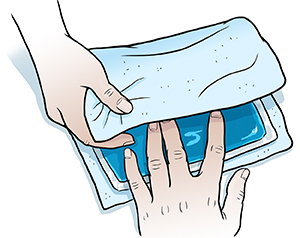Infected Insect Bite or Sting
When an insect stings you, it injects venom. When an insect bites you, it does not. Stings and bites may cause a local reaction. Or they may cause a reaction that affects your whole body. Bites and stings may become infected. Signs of infection include redness, warmth, pain, redness streaking up the arm, drainage of pus, and swelling. Infections will need treatment with antibiotics and should get better over the next 10 days. But they can sometimes form a pocket of pus (abscess) that needs to be opened by a healthcare provider to release the pus.
Home care
The following will help you care for your bite or sting at home:
-
If a stinger is still in your skin, it will need to be removed. Don't use tweezers that might push more venom into the skin. Gently scrape the stinger from the side with a firm object, such as the side of a credit card. This will loosen it and remove it from your skin. Wash the area with soap and water.
-
If itching is a problem, applying ice packs to the sting area will help. You can make your own ice pack by putting ice cubes in a bag that seals and wrapping it in a thin towel. Don’t put the ice directly on your skin because it can damage the skin. Apply the ice pack for 5 to 10 minutes.
-
Wash the area with soap and water at least 3 times a day. Apply a topical antibiotic cream or ointment.
-
You can use an over-the counter antihistamine unless your healthcare provider has given you a prescription antihistamine. You may use antihistamines to reduce itching if large areas of the skin are involved. Use lower doses during the daytime and higher doses at bedtime since the medicine may make you sleepy. Don't use an antihistamine if you have glaucoma or if you have trouble urinating due to an enlarged prostate. Some antihistamines cause less drowsiness and are a good choice for daytime use.
-
If oral antibiotics have been prescribed, be sure to take them as directed until they are all finished.
-
You may use over-the-counter pain medicine to control pain, unless another pain medicine was prescribed. Talk with your healthcare provider before using acetaminophen or ibuprofen if you have chronic liver or kidney disease. Also talk with your healthcare provider if you have ever had a stomach ulcer or digestive bleeding.
 |
| Always wrap ice in a thin towel before putting it on your skin. |
Follow-up care
Follow up with your healthcare provider, or as advised if you don't get better over the next 2 days or if your symptoms get worse.
Call 911
Call 911 if any of these occur:
-
Swelling of the face, eyelids, mouth, throat, or tongue
-
Trouble swallowing or breathing
-
Chest tightness
When to seek medical advice
Call your healthcare provider right away if any of these occur:
-
Spreading areas of redness or swelling
-
Fever of 100.4°F (38°C) or higher, or as directed by your healthcare provider
-
Increasing pain, redness, swelling or drainage
-
Headache, fever, chills, muscle or joint aching, or vomiting
-
New rash
Online Medical Reviewer:
Eric Perez MD
Online Medical Reviewer:
Jessica Gotwals RN BSN MPH
Online Medical Reviewer:
Paula Goode RN BSN MSN
Date Last Reviewed:
6/1/2022
© 2000-2025 The StayWell Company, LLC. All rights reserved. This information is not intended as a substitute for professional medical care. Always follow your healthcare professional's instructions.